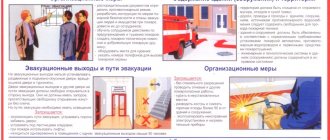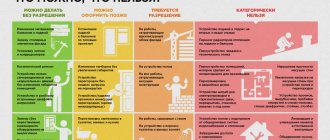Identification of violations
Violations of improper use of housing can be established in different ways. From time to time, such facts are revealed as a result of planned and unscheduled inspections by law enforcement agencies and housing inspections.
At the same time, there are complaints from residents of neighboring apartments about violators. Such claims, as a rule, are sufficient to organize an inspection at the location of the object, during which the misuse of the premises is confirmed. Based on the identified violations, a procedural protocol is drawn up.
The collected materials on the administrative offense are sent to the magistrate for consideration. In the course of a detailed study of all the circumstances, the fact of the citizen’s guilt is established, and penalties and other sanctions are imposed.
It is worth noting that penalties are applied for each fact of using housing for other purposes. Moreover, if the violation is repeated several times, damage to the premises may lead to the forcible seizure of the object on the basis of a court decision.
In case of damage to the apartment and systematic violations, the culprit will be held accountable and obligated to:
- Return the condition of the room to its original state.
- Compensate for property damage, as well as moral damage caused to neighboring residents.
- Forcibly terminate the social rental agreement with subsequent eviction of violators.
Is it possible to use residential premises for an office or other type of business activity?
The general approach is formulated in Art. 17 of the Housing Code of the Russian Federation, which establishes that any residential premises can be used for professional activities or individual entrepreneurial activities by its owner or persons legally residing in this premises. That is, individual entrepreneurs and self-employed people can use their housing for business activities.
By the way, the same applies to employees who work remotely, which has become increasingly popular lately.
Can a legal entity use an apartment for an office? Formally, it seems not, since it is not clearly stated anywhere. At the same time, we believe that it very well can. Since a legal entity can be registered at the address of the director, the director has the right to carry out his professional activities in his apartment or house, while simultaneously representing the legal entity.
If we really go too far in our reasoning, then employees who work under employment contracts with companies from home, from a formal point of view, use their housing to carry out the business activities of this legal entity and make a profit for their company.
Thus, it turns out that legal entities can also use housing for business purposes.
Legislative regulation
The purpose of a residential premises and the limits of its use are regulated by a mass of regulatory documents, and familiarization with them will help to avoid serious mistakes.
- The Housing Code is the basic law in the field of housing law, lists the basic rights and obligations of both the owner and the user of residential premises, and contains many other provisions.
- Civil Code - defines the general rules for the use by citizens of their rights, housing, in particular, it gives the definition of residential premises and the basic criteria for its use.
- Code of Administrative Offenses – the basis and limits for bringing liability, options for punishment for violations, in particular, the use of residential premises for other purposes.
- By-laws of a technical nature, for example, rules for the use of residential premises, its maintenance and repair.
- Sanitary and other hygienic standards determine the degree of danger of a particular activity.
Partially, the influence comes from judicial practice: the positions of the RF Armed Forces in the resolutions of the Plenums and Reviews of Practice.
EXAMPLE No. 2
The entrepreneur included in the expenses 63 thousand rubles, spent on payment for a set of works on installation and commissioning of video surveillance systems in his apartment.
These works were carried out under a contract concluded with another individual entrepreneur.
During the tax audit, the inspectorate additionally assessed a single tax paid in connection with the application of the simplified tax system, due to the exclusion of 63 thousand rubles from the expenditure side of the tax base.
The entrepreneur lost in all courts.
Rejecting the entrepreneur’s arguments that the specified building is his office, the courts proceeded from the following:
- according to information from the authorities that register rights to real estate and transactions with it, at the address in Tyumen there is a residential building owned by an entrepreneur;
- there was no transfer of residential premises to non-residential premises;
- documents on the supply of office supplies and water to this address do not clearly indicate the use of a residential building as an office;
- a different address is indicated on the entrepreneur's letterhead. The same address is indicated on most concluded contracts and documents emanating from this person.
Based on the above, taking into account that the entrepreneur has not provided evidence that this property is being rented out or was being prepared for sale, which is his type of business activity, the court’s conclusion about the lawful additional tax assessment is correct (Resolution of the Administrative Court of the West Siberian District dated November 27. 2015 No. A70-15510/2014).
Important!
As we can see, the businessman lost this dispute due to the fact that he could not prove that he carried out activities aimed at generating income in the residential premises. At the same time, the evidence base of the tax authorities, on the contrary, was more convincing.
“TAX HOLIDAYS” FOR INDIVIDUAL ENTREPRENEURS CARRYING OUT ACTIVITIES IN THE PRODUCTION, SOCIAL AND SCIENTIFIC FIELDS
Using an object for purposes other than its intended purpose
We are going to purchase a building for an office, but the title in the certificate says that it is a shopping and hotel complex. If we do not use it for its intended purpose, what liability can there be for the improper use of non-residential premises? What to do in such a situation? Require the seller to make changes before the sale? Or, in principle, it doesn’t matter? 3. If you transfer, then which one is better - to the administrative building? How best to arrange this?
A change of name (shopping and hotel complex, administrative building) in cadastral registration information is possible at the request of the copyright holder on the basis of a technical plan prepared by a cadastral engineer. To do this, the owner of the property must contact the cadastral engineer to prepare a technical plan, and then the cadastral registration authority with an application to make changes to the cadastral registration information, attaching a technical plan with a new name.
After entering information about a change of name in the state real estate cadastre, the owner must contact the relevant body of Rosreestr with an application to make changes to the information in the unified state register of rights to real estate and transactions with it and to issue a new certificate.
Such actions are paid. The current legislation does not provide for any liability for the use of a building not in accordance with its name. The owner himself has the right to determine what name of the object to give, whether to change it, or not to use any name at all.
They may be held liable for using a land plot for other than its intended purpose or in violation of the type of permitted use. See recommendation: How to challenge a fine for using a land plot not for its intended purpose or in violation of the type of permitted use (Part 1 of Article 8.8 of the Code of Administrative Offenses of the Russian Federation)
The rationale for this position is given below in the materials of the Lawyer System.
“In accordance with Part 8 of Article 41 of the Federal Law of July 24, 2007 No. 221-FZ “On the State Real Estate Cadastre” (hereinafter referred to as the Cadastre Law), information about a building or structure, with the exception of information about the location of such real estate on a land plot, is indicated in technical terms, on the basis of the cadastral work permit submitted by the customer for the commissioning of such real estate objects, design documentation of such real estate objects or manufactured before 01.01.
2020 technical passport of such real estate objects. In the absence of these documents, the relevant information is indicated in the technical plan on the basis of a declaration drawn up and certified by the copyright holder of the property; this declaration is attached to the technical plan and is an integral part of it.
Clause 16 of the Requirements for the preparation of a technical plan of a building, approved by order of the Ministry of Economic Development of Russia dated September 1, 2020 No. 403 (hereinafter referred to as Requirements No. 430), and clause 14 of the Requirements for the preparation of a technical plan of a building, approved by order of the Ministry of Economic Development; Russia dated November 23, 2020 No. 693 (hereinafter referred to as Requirements No. 693), a list of documents is established on the basis of which information about the property, including the name of the building or structure, is subject to indication in the technical plan of the building or structure.
In this case, a change in the name of a building or structure may be associated with a change in its functional use (without reconstruction of such a building or structure), as well as in connection with a change in the purpose of such a building or structure.
Taking into account the above, we believe that the documents on the basis of which it is possible to change the name of a building or structure are:
permission to put an object into operation (in case of a change in the name of a building or structure in connection with their reconstruction, as well as a change in the purpose of a building or structure in connection with their reconstruction, or when reconstruction is required);
act of an authorized government body or local government body (in case of a change in the name of a building or structure or the name and purpose of a building or structure not related to their reconstruction);
decision of the owner (in case of changing the name of a building or structure, when their reconstruction is not required, and it is not related to a change in the purpose of the building or structure).
At the same time, in accordance with paragraphs 16, 45 of Requirements No. 403 and paragraphs 14, 52 of Requirements No. 693, copies of these documents are included in the annex to the technical plan of the building or structure, and additional justification is provided in the section “Conclusion of the cadastral engineer” of the technical plan of the building or structure information about changing the name of a building or structure.
We also believe that the change of name should be carried out in accordance with the requirements of the current legislation, including in terms of compliance with the requirements of the urban planning plan, design documentation, as well as compliance of the type of permitted use of the land plot with the purpose of the building or structure located on it. »
EXAMPLE No. 1
The company rented a residential building from its director. According to the agreement, the lessor (director) leases to the company a residential building (built in 2010 in good condition, meeting the requirements for occupied residential premises) for use to house the management staff and other services of the tenant. The term of the agreement is 11 months; upon expiration of the agreement, the company and the director entered into a new lease agreement for 11 months. The rent is 208 rubles 47 kopecks per 1 sq. m. m or 100 thousand rubles per month excluding VAT. Services and company employees were located in the residential building.
The company took into account all expenses (rent, repairs) in tax accounting on the basis of clause 49, clause 1, article 264 of the Tax Code of the Russian Federation.
The company incurred more than 4 million rubles in expenses for the renovation of a residential building with subsequent recognition in tax accounting.
The tax authorities' claims boiled down to the fact that the company's expenses incurred in connection with the renovation of a residential building rented from the director, within the meaning of Article 288, paragraph 2 of Article 671 of the Civil Code of the Russian Federation, paragraph 38 of the resolution of the Plenum of the Armed Forces of the Russian Federation and the Plenum of the Supreme Arbitration Court of the Russian Federation dated 07/01/1996 No. 6/8 “On some issues related to the application of part one of the Civil Code of the Russian Federation”, Article 260 of the Tax Code of the Russian Federation cannot reduce the taxable base for income tax.
In addition, by analyzing the reports of completed work, the inspection found that the contractor carried out external cladding of the surface of the walls of the building with facade panels, lining of window openings, as well as repair of junctions of walls and partitions, notching of surfaces for plaster, leveling of plaster, and painting of facades. That is, the actions taken by the company to improve the leased property constitute a single set of repairs that meet the criteria of inseparability from the property being repaired, and were carried out with the knowledge and consent of the lessor.
Important!
These circumstances indicate the intention of the director of the company to carry out a set of repairs to his residential building at the expense of the company, thus receiving a benefit in the form of a gratuitously renovated residential building (for himself) and in the form of a reduction in the tax base for income tax (for the company itself).
The judges also noted that the owner of a residential premises does not have the right to place enterprises, institutions or organizations in it until it is transferred to non-residential status (clause 3 of Article 288 of the Civil Code of the Russian Federation).
A residential building being leased is not an object of fixed assets of the lessor.
For this reason, the costs of repairing a residential building rented from the director do not form an independent fixed asset and cannot be taken into account as such.
In addition, the court did not see any grounds for reducing the fine under Article 123 of the Tax Code of the Russian Federation to 50 thousand rubles (Resolution of the Administrative Court of the North Caucasus District dated April 24, 2017 No. A53-1756/2016).
ACCOUNTING MAINTENANCE FOR IP, USN
Package of documents and pitfalls of repurposing
3. If it is intended to change the functional purpose of the non-residential premises of the building, it is necessary to find out the status of the property.
In cases where the building is of cultural or historical value, then another organization, such as the City Cultural Heritage Committee, will be included in the procedure for changing the profile, whose consent will need to be obtained.
We recommend reading: If you don’t have a vacation before maternity leave
The procedure for changing the functional purpose of non-residential premises may seem quite simple, however, as in any legal issue, there are a lot of nuances that can make the procedure almost impossible.
The pitfalls that accompany any procedure related to government agencies can be easily avoided using the experience of professionals.
— will carry out the work of changing the functional purpose of the premises in the shortest possible time, saving money and the nervous system, which, alas, often suffers when a person is faced with an impenetrable bureaucratic state apparatus.
In addition, every day of delay is your lost profit, since until a change in the functional purpose of non-residential premises is legally secured, your company cannot begin active operations.
Purpose of use of non-residential premises: definition, classification and procedure for change
A room that does not meet certain sanitary and epidemiological requirements and fire safety standards is classified as non-residential.
Such real estate has its own purpose, in accordance with which it should be used. More information about the intended use of non-residential premises can be found in this article.
Dear readers! Our articles talk about typical ways to resolve legal issues, but each case is unique.
If you want to find out how to solve your particular problem, just call, it’s fast and free!
Rights and obligations of the owner of non-residential premises in a residential building
Thus, the powers and responsibilities of the owner include (Article 30 of the Housing Code of the Russian Federation):
- possession, use and disposal of premises;
- provision under a contract for the possession and use of such premises to other persons;
- maintenance of the premises;
- maintaining the premises in proper condition, as well as other obligations and rights established by law.
So, all premises are classified by law into residential and non-residential. The law does not provide a unified classification of non-residential premises. A change in the functional (purpose) purpose of non-residential premises is usually carried out without additional permissions from government agencies, provided that such a change does not contradict the requirements of SanPin, GOST, agreement of the parties or regional legislation.
Expenses for the renovation of a residential premises used by an entrepreneur as an office
By virtue of Article 252 of the Tax Code of the Russian Federation, any expenses are recognized as expenses, provided that they are incurred to carry out activities aimed at generating income.
As evidenced by judicial practice, tax authorities do not recognize expenses associated with the repair of residential premises as justified, since the costs of repairing residential premises do not relate to the costs of repairing fixed assets provided for in paragraph 3 of paragraph 1 of Article 346.16 of the Tax Code of the Russian Federation. According to tax authorities, the costs associated with bringing residential premises to a state suitable for use as an office also do not meet the requirements of clause 2 of Article 346.16 of the Tax Code of the Russian Federation.
Rules for the use of residential premises
By government decision (Decree No. 25 of January 21, 2006), rules for the use of residential premises were adopted. This document applies to owners and users. He reveals the contents of Art. in more detail. 17 Housing Code of the Russian Federation.
It does not matter on what basis the housing was received (acquired by ownership or from the state or from an enterprise or employing organization). The set of rights and responsibilities is standard.
Their approximate list:
- the right of residence belongs to the owner and tenant and their family members and other persons whom they allowed to move in;
- the entry of other persons is permitted with the permission of other residents, with the exception of children who have not yet turned 18 years of age;
- Renting out premises is permitted with the consent of other residents and the owner;
- the tenant’s responsibilities include carrying out routine repairs, unless otherwise provided by agreement with the owner;
- the employer is obliged to pay utilities and other services on time;
- the resident is obliged to take care of the common property of the owners of the house, take measures to preserve it, and inform the owner about their need;
- redevelopment and reconstruction of residential premises is carried out exclusively in the manner prescribed by law.
The use of residential premises also implies rights. For example, a tenant has the right to demand proper living conditions.
Often, authorities offer citizens in need of housing premises that are clearly not suitable for this.
They either do not have normal heating, there is no drainage, and the minimum compliance with sanitary standards is not ensured.
Considering the fact that there is a whole mass of regulatory documents, the rules for the use of residential premises are indicative.
Transfer of premises to non-residential premises
In connection with the considered restrictions, the best way to rent out residential premises to a commercial organization for office needs is to transfer it to non-residential stock. The procedure for transfer is determined by Article 23 of the RF Housing Code.
The decision to transfer residential premises to non-residential premises and vice versa can only be made by a local government body. To do this, the owner or a person authorized by him, acting on the basis of a power of attorney, must send the following documents to the MFC or directly to the registration authority:
- Application for transfer of premises.
- Originals or notarized copies of title documents. These include contracts, court decisions and other documents confirming the legality of the acquisition of residential premises, as well as an extract from the Unified State Register of Rights. The validity period of the last document is 1 month from the date of receipt, the remaining documents are valid indefinitely.
- Reconstruction or redevelopment project, if such actions are expected.
- Minutes of the general meeting of premises owners, if the premises of an apartment building are transferred to non-residential stock.
- Consent of all owners of premises that are adjacent to the premises being transferred, that is, they have common walls or are located directly above or below it.
The period for consideration of documents by the local government body is 45 days.
Fine for improper use of residential premises
The most common cases of violation of the purpose of operating a residential property are found in multi-apartment buildings. The rooms and apartments in them are designated exclusively for human habitation.
However, in a number of situations, owners use the space as commercial space.
For example, shops, cafes, beauty salons are opened on the first floors of houses, or apartments are simply allocated for storage space.
The Housing Code of Russia allows such use of apartments, but only after the procedure for transferring the object to the status of non-residential premises. In this case, the following conditions must be met:
- The room or apartment is located only on the ground floor of the building or all the premises below it are non-residential;
- There must be no access from the transferred premises to residential premises;
- The building should not be part of a socially used structure;
- Compliance with sanitation standards;
- Permission has been obtained from the local administration and home owners;
- The purpose of transfer to a non-residential fund should not be religious activity;
- Major changes to the structure of the premises that affect the stability of the building itself are not allowed.
If a legal transfer to the status of a non-residential property has not been made, and the apartment is used for purposes that exclude the residence of citizens, then the owner will bear administrative liability.
Choosing interior and technological equipment for the office
With an average office area of 18-25 square meters, it can accommodate 3-4 people. If there are several adjacent rooms in the house, they can be efficiently arranged to make the most of the space.
Correct layout of the room is possible subject to the following rules:
- Order a design project from a special company.
- If you need to arrange several workplaces, use computer programs to view the layout of the room in 3D format - this will allow you to use the space rationally.
- Separate the work area from the rest area. It is enough to buy a small soft sofa and a table in the corner.
Many people recommend applying the rules of Feng Shui when arranging an office: add more greenery, use wood and glass for design, maintain a balance of natural and artificial lighting.
Different equipment requires a certain workplace area:
- For old PCs - at least 6 m2 per person.
- For plasma and LCD displays – no less than 4.5 m2.
- If you need to do creative work or require increased attention, the places are separated by partitions 2 m high.
If you will be the only one working in the office, it is better to place the table in the middle and facing the front door. Be sure to buy a chair with wheels. For office equipment, you need cabinets, tables, chairs and office equipment. Depending on the specifics of the activity, a telephone or several PCs may be required. Please remember that only licensed PC software can be used.
Stages of repurposing premises
Repurposing premises requires the following activities:
- obtaining technical documentation for premises in BTI;
- sending an application to the district prefecture for reassignment;
- obtaining consent from the prefecture;
- preparation of design documents for the new intended use of the premises;
- approval of the project in the Central State Sanitary and Epidemiological Service, the Main Directorate of the Ministry of Emergency Situations, the Directorate of the single customer, the district government and other authorities in accordance with the new type of use of the facility (if the purpose of the rented premises changes, it is necessary to obtain the written consent of the lessor);
- sending documents to the territorial office of the Housing Inspectorate;
- obtaining permission from the Housing Inspectorate for reconstruction and redevelopment.
Only after successfully passing all of the above authorities can the refurbishment of premises for new use begin. All work must strictly comply with the design documents.
Repurposing the purpose of non-residential premises in residential buildings also requires obtaining an act of putting the facility into operation. After this, you can order new technical documents from the BTI, which will indicate the new purpose of the premises. If the owner has changed, then it is also necessary to obtain a new certificate of registration of rights.
Rules for doing business on the premises
In some cases, registration of housing as non-residential premises is not required and in this case the activities of the entrepreneur are significantly limited by law.
Any business idea related to implementation in a residential building must meet several rules:
- Do not violate the rights and freedoms of others, in particular neighbors or other residents of the apartment.
- Do not produce on an industrial scale.
According to Art. 17 of the Housing Code of the Russian Federation, only individual entrepreneurs or citizens providing professional services at home can carry out labor activities in the territory of their own housing. This opportunity is not provided for legal entities and companies cannot resort to the possibility of creating office space in an apartment.
Legal entities are allowed to use as an office only those apartments or houses that have been transferred to non-residential stock in accordance with the rules and specifics of Russian legislation.
Without re-registration, their own home can be used as an office by:
- lawyers;
- nannies;
- tutors;
- accountants;
- consultants;
- translators, etc.
Have a question or need legal help? Take advantage of a free consultation:
When drawing up a lease agreement for an apartment for office space, it is necessary to rely on the law and strictly follow legal norms. For legal entities, you can draw up a lease agreement only for the use of the apartment as housing for employees of the enterprise.
Despite this, many apartments are used as offices for a variety of categories of entrepreneurs and businessmen. On the one hand, according to the norms of the Civil Code of the Russian Federation, carrying out commercial activities on the territory of living space is not permissible, on the other hand, according to the norms of the Housing Code of the Russian Federation, this is quite possible and true.
Drawing up a lease agreement requires great care and knowledge of the intricacies of the law in this matter, since through ignorance you can easily violate several rather serious legal norms.
The contract must be concluded based on the following rules and regulations:
- a lease agreement must be drawn up indicating all the subtleties and nuances necessary for this act;
- the contract must clearly state that the placement of industrial production on the premises is prohibited, since this action is contrary to the law;
- the residential premises must meet all the requirements of office buildings - from the presence of an additional emergency entrance to compliance with fire, environmental and other safety standards and regulations;
- When using the living space, the tenant is obliged to respect the rights and interests of the neighbors of the property owner.
For legal entities, it is vitally important to correctly and clearly formulate the purpose of drawing up a lease agreement for residential or non-residential premises, since incorrectly specifying the purposes can lead to a large number of problems.
Any apartment rental agreement must reflect the following nuances:
- documents on real estate ownership;
- purpose of the lease;
- detailed plan or description of the living space;
- rental period of the premises;
- the amount of monthly (or quarterly) payments;
- amount of compensation for damage to the apartment;
- responsibilities for the repair and use of the home;
- obligations to pay for utilities;
- conditions for termination of the contract.
Possible problems

The most important problem with leasing residential real estate for commercial use is legislative delays and contradictions, which speak only to one general aspect - legal entities cannot rent housing for office space. This opportunity exists only for individual entrepreneurs and citizens engaged in the provision of professional services.
A possible solution to the problem is to close the LLC and register the citizen as an individual entrepreneur, however, if it is impossible to carry out such procedures, you can try to arrange a sublease for an individual entrepreneur, which is under the control of the LLC.
Representatives of the financial department recently returned to consider the issue of recognizing expenses for renting residential premises for businessmen to conduct business activities.
The Letter of the Ministry of Finance of the Russian Federation dated March 28, 2017 No. 03-11-11/17851 analyzed the possibility of recognizing expenses for renting a residential building to accommodate a private kindergarten.
First of all, financiers turned to the provisions of housing legislation.
According to clause 2 of Article 15 of the Housing Code of the Russian Federation, an isolated premises is recognized as residential, which is real estate and is suitable for permanent residence of citizens. Residential premises include a residential building (part of a residential building), an apartment (part of an apartment), a room (clause 1 of Article 16 of the Housing Code of the Russian Federation).
TAX AUDIT
Residential premises are intended for the residence of citizens (Clause 1, Article 17 of the Housing Code of the Russian Federation).
A citizen who owns a residential property can use it for personal residence and for the residence of his family members. Residential premises can be rented out by their owners for living on the basis of an agreement.
The placement by the owner of enterprises, institutions, and organizations in the residential premises he owns is permitted only after the transfer of such premises to non-residential premises. The transfer of premises from residential to non-residential is carried out in the manner determined by housing legislation.
At the same time, it is allowed to use residential premises for carrying out professional activities or individual entrepreneurial activities by citizens living there legally, if this does not violate the rights and legitimate interests of other citizens, as well as the requirements that the residential premises must meet.
IP REGISTRATION, PRICE
In accordance with paragraph 3 of Article 23 of the Civil Code of the Russian Federation, the rules of the Civil Code of the Russian Federation, which regulate the activities of legal entities that are commercial organizations, are applied to entrepreneurial activities of citizens carried out without forming a legal entity, unless otherwise follows from the law, other legal acts or substance legal relations.
In accordance with paragraph 4 of paragraph 1 of Article 346.16 of the Tax Code of the Russian Federation, taxpayers who apply the simplified tax system with the object of taxation “income reduced by the amount of expenses”, when determining the object of taxation, reduce the income received by the amount of rental (including leasing) payments for the leased property ( including leased property.
According to clause 2 of Article 346.16 of the Tax Code of the Russian Federation, expenses are accepted subject to their compliance with the criteria specified in clause 1 of Article 252 of the Tax Code of the Russian Federation.
And the conclusion of the financiers is that the entrepreneur’s expenses for renting a residential building to house a private kindergarten should not be taken into account when determining the object of taxation under the “simplified” tax.
Important!
Thus, civil and housing legislation does not allow the use of residential premises for purposes not related to the residence of citizens. The latter circumstance, in the opinion of regulatory authorities, makes tax accounting of expenses for renting residential premises impossible (Letter of the Ministry of Finance of the Russian Federation dated March 28, 2017 No. 03-11-11/17851).
Financiers have expressed a similar position earlier (Letters of the Ministry of Finance of the Russian Federation dated September 29, 2014 No. 03-03-06/1/48504, dated February 14, 2008 No. 03-03-06/1/93, dated October 28, 2005. No. 03-03-04/4/71).
The financiers argue their position by the fact that the expenses of businessmen for renting residential premises do not meet the criteria of clause 1 of Article 252 of the Tax Code of the Russian Federation. And documented expenses mean expenses confirmed by documents drawn up in accordance with the legislation of the Russian Federation.
By violating the provisions of the Housing Code of the Russian Federation (use of residential premises for other purposes), businessmen cannot recognize these expenses as justified.
By virtue of Article 252 of the Tax Code of the Russian Federation, any expenses are recognized as expenses, provided that they are incurred to carry out activities aimed at generating income.
As evidenced by judicial practice, tax authorities do not recognize expenses associated with the repair of residential premises as justified, since the costs of repairing residential premises do not relate to the costs of repairing fixed assets provided for in paragraph 3 of paragraph 1 of Article 346.16 of the Tax Code of the Russian Federation. According to tax authorities, the costs associated with bringing residential premises to a state suitable for use as an office also do not meet the requirements of clause 2 of Article 346.16 of the Tax Code of the Russian Federation.
- according to information from the authorities that register rights to real estate and transactions with it, at the address in Tyumen there is a residential building owned by an entrepreneur;
- there was no transfer of residential premises to non-residential premises;
- documents on the supply of office supplies and water to this address do not clearly indicate the use of a residential building as an office;
- a different address is indicated on the entrepreneur's letterhead. The same address is indicated on most concluded contracts and documents emanating from this person.
Based on the above, taking into account that the entrepreneur has not provided evidence that this property is being rented out or was being prepared for sale, which is his type of business activity, the court’s conclusion about the lawful additional tax assessment is correct (Resolution of the Administrative Court of the West Siberian District dated November 27. 2015 No. A70-15510/2014).
Important!
As we can see, the businessman lost this dispute due to the fact that he could not prove that he carried out activities aimed at generating income in the residential premises. At the same time, the evidence base of the tax authorities, on the contrary, was more convincing.
“TAX HOLIDAYS” FOR INDIVIDUAL ENTREPRENEURS CARRYING OUT ACTIVITIES IN THE PRODUCTION, SOCIAL AND SCIENTIFIC FIELDS









